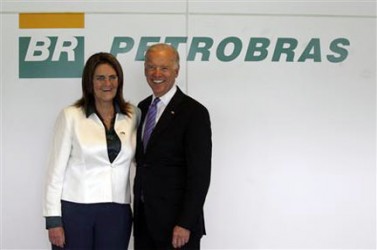RIO DE JANEIRO, (Reuters) – U.S. Vice President Joe Biden encouraged Brazil yesterday to open its economy further to keep up with free trade trends worldwide as he started a visit aimed at boosting business between the two largest economies in the Americas.
Much of the future relationship with the United States will depend on whether Brazil, whose economy still remains relatively protected by high tariffs and other barriers, can make trade easier, Biden said in a speech to local authorities and business leaders at a wharf by Rio’s port.
Biden, citing U.S. efforts to deepen trade and investment ties with China, Europe, and other faster-growing countries on Latin America’s Pacific coast, pressed Brazil not to fall behind.
“It’s up to Brazil to decide whether to pursue this path and seize the opportunities,” Biden said.
His three-day visit, part of a week-long swing through South America and the Caribbean, comes as Washington gears up for a state visit by President Dilma Rousseff later this year.

Brazil’s economy – the world’s seventh-biggest – is slowly rebounding from a two-year lull following a decade of growth. Brasilia is seeking more clout with the United States and other major economies it increasingly sees as its peers.
Biden urged Brazil, which has historically refrained from criticizing authoritarian regimes from Cuba to the Middle East, to be more vocal in the defense of democracy. While praising Brazil’s successful emergence, Biden said “what goes with that is the worldwide responsibility to speak.”
After divergences on trade, Middle East policy and other differences during the administrations of their predecessors, Rousseff and U.S. President Barack Obama have gradually forged closer diplomatic ties in hopes that their nations can become larger markets for one another.
The two countries have made incremental progress on trade issues such as agriculture, energy, aviation and space technology.
In recent weeks, leaders of major U.S. and Brazilian companies have been lobbying both governments to work on more of the small agreements that over time could add up to wholesale progress for bilateral business.
“Everybody’s looking for building blocks to bring the countries closer together,” said one U.S. official who spoke on condition of anonymity. “It’s indicative of how people are trying to give greater structure to our trade and investment.”
OIL AND JET FIGHTERS
Biden toured a research facility of state-run oil giant Petrobras with the company’s president, Maria das Gracas Foster, and was briefed on the geology of Brazil’s offshore subsalt fields, where U.S. firms are keen to operate.
He later discussed aviation, energy, infrastructure and industrial issues with senior executives from leading private companies Boeing Co, Chevron, construction conglomerate Odebrecht and steelmaker Gerdau.
“I want to underscore the importance of the private sector in terms of our relationship,” Biden told reporters, stressing that companies, not governments, could do the most to build ties between the two countries.
Among many pending issues between the United States and Brazil are a longstanding effort to ease visa restrictions for travel between the two nations and a push by U.S. companies for protection of intellectual property rights in a Brazilian marketplace rife with pirated software and technology.
Meanwhile, Washington is still urging Brazil to back Boeing on a planned purchase to upgrade its fighter jet fleet. Brazil, for its part, is eager to get U.S. backing for long-coveted permanent seat on the U.N. Security Council.
After a visit by Obama to Brazil in 2011, the White House said it recognized Brazil’s ambitions at the United Nations, but stopped short of backing its call for a place on the council.
Rousseff is expected to make a state visit to Washington in October, the first by a Brazilian leader in two decades. While she has already been on official business to the United States as president, the full state visit will last longer and involve closer diplomacy.





